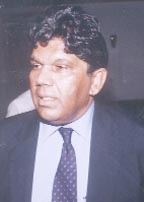In an effort to build private sector interest in the University of Guyana (UG), it needs a combination of an entrepreneur and an efficient administrator who could reach out and raise funds, according to immediate past Chancellor Dr. Bertie Ramcharan.

To fulfil this objective, he has recommended combining the positions of Chancellor and Vice-Chancellor into the position of the President of the University. Ramcharan made this recommendation and others in a column, “The University of Guyana: Some policy recommendations,” which was published in the Saturday August 15, 2009 edition of the Stabroek News.
He said he offered the recommendations publicly because they are of such a nature as to deserve public interest and attention. He also noted that UG is somewhat hidden away from public scrutiny.
As part of his recommendation, he explained that the position of President was part of the model in many American colleges and also departs from the Commonwealth experience. As Chancellor, Ramcharan recalled he met with representatives of the business community and had the impression that there were assets to be tapped but there were problems of confidence in the institution. “A university president would have the responsibility to reach out to these and other communities,” he added.
Further, he recommended that parliament have a role in confirming members of the university council. Ramcharan said it would be fair to say that the university body has been hardly functioning, adding that when it does meet “it might be lucky to have a quorum. The level of magnanimity of its members was not spectacular and one often had the impression that the university deserved better,” he noted, adding that “political skirmishing was common place.” He said too that he had to serve as peacemaker.
He called too for the Minister of Education to lay before parliament each year, a report on the progress of the university which should engage in open debate. This, he feels, would raise the profile of the university and generate a national consensus on its future development.
Ramcharan, who said the recommendations were made in positive spirit for all who have served and continue to serve the university, has also suggested that the university council designate a public inspector who would table an annual report on its administration and functioning. He explained that during his tenure Deans and Professors sometime came with simple requests, including the issue of insufficient seating in classrooms or having no lectern on which to put lecture notes. While they were not difficult issues to resolve, he said a public inspector submitting an annual report would bring issues such as these to the public’s attention and sharpen the performances of the responsible officials.
Emphasising too that Guyana deserved the best university it can support, Ramcharan suggested too that the position of Pro Chancellor be revisited and probably abolished. But if retained, he said it should not be held by a serving officer, and not by the senior information operative of the government. He was referring to Prem Misir.
He said he had a most cordial relationship with the Pro-chancellor but referred to the proverbial saying that “one cannot serve God and mammon.” He noted that there were times when the voice of God spoke through the Pro-chancellor. Ramcharan explained that the position was created to help facilitate the Chancellorship of senior personalities who loaned prestige to the university but could not devote enough time to its day-to-day affairs. He said the statute did not delegate the position and in acting in the absence of the Chancellor, the Pro-Chancellor is the real head of the university.
He explained that the chancellor comes in for the annual business meeting and for the annual graduation ceremonies but for the rest of the year, the institution was in the hand of the pro-chancellor.
Meanwhile, Ramcharan said he saw the best of the university in its graduating students who overcame many hurdles in their quest for an education and he urged that a modernised relationship agreement be concluded between the university and its senior West Indian counterpart, the University of the West Indies (UWI). He said this could help UG to draw upon the counsel and advice of UWI and help improve quality controls. A parliamentary commission, he said, may be designated to look into this issue.








